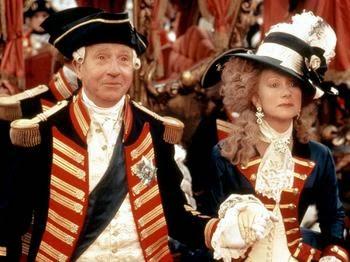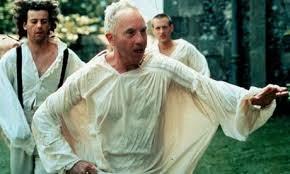
"I am the verb, sir, not the object!"
Alan Bennett's play The Madness of George III arrived onscreen with its director (Nicholas Hytner), star (Nigel Hawthorne) and writer intact. The Madness of King George (1994) is unusually droll for a costume film, lavishly directed and bolstered by Hawthorne's splendid performance. Yet a few missteps prevent it from achieving greatness.It's 1788 and England's ruled by King George III (Nigel Hawthorne), a gregarious but unstable monarch. His already pronounced eccentricities boil over into violently irrational behavior, including public profanity and violence. The King's condition prompts George, the Prince of Wales (Rupert Everett) to seek power as Regent, with the backing of Whig leader Charles Fox (Jim Carter). Prime Minister William Pitt (Julian Wadham), desperate to save his government, calls upon Dr. Willis (Ian Holm) to cure the King by any means necessary.
The Madness of King George avoids ossifying its subject. Bennett's script bristles with edgy, playful dialogue, from the King's rants to the verbal gamesmanship ("I enjoy a good balance sheet"). There's the customary opulence, with Andrew Dunn's immaculate photography framing scenes like Hogarth paintings. Yet Hytner undercuts decorum with surreal touches: musicians playing Greensleeves on glass bells, a half-naked King leading prayers in a field, a pastoral farm revealed as a mad house. When the King departs from a concert, everyone immediately plops into a chair.
Hytner and Bennett undercut everyone's nobility. Fox mouths reform but uses the debauched Prince of Wales to achieve it. The Prince resents the King's ignoring him and longs to marry Maria Fitzherbert (Caroline Harker), a Catholic. As a womanizing, obese slob though, he doesn't accrue sympathy. The smartest character is Lord Thurlow (John Wood), the Chancellor who manipulates Pitt and Fox. The women seem well-adjusted - Queen Charlotte (Helen Mirren) snaps George into lucidity, while Maria urges the Prince towards sensible actions - so naturally they're marginalized.
Perhaps George's scope proves its downfall. For all the political maneuvering its importance isn't clear or especially gripping: offhand references to American independence and abolitionism are all we get. Neither Pitt nor Fox espouses actual positions, viewing the King's predicament as an opportunity to seize power. Perhaps it's intentional (how else would 1994 viewers companion monarchists over reformers?), but the film seems more flippant than cynical. Then again, George posits the King's recovery as a happy ending when he backslid into insanity two decades later.

The most memorable scenes aren't politicking but the King's absurdity and his brutal treatment. The King's physician (Roger Hammond) refuses a physical examination while another obsesses over the shape of his turds. He's subjected to brutal blistering, bloodletting and (at Dr. Willis's instigation) ritual humiliation. At one point he's bound and gagged into a chair, cruelly mocking his coronation. "I am the King!" George protests. "You sir, are the patient!" Willis snaps. With such treatment it's a miracle George recovers.
Thankfully, Hytner retained Nigel Hawthorne (then known for Yes, Minister) from George's stage incarnation. The King must be broad yet pitiable; play it too strong and it's mere scenery-eating. Hawthorne plays the sane King as a jolly eccentric, snorting at pigs and laughing off an assassination attempt; his slip into nuttiness seems remarkably subtle. Hawthorne provides his madness a carefree exuberance, more affecting when moments of sanity stab through. He retains our sympathy throughout, a truly incredible performance.
Helen Mirren (with halting German accent) is unusually delicate yet dignified in a low-key turn. Rupert Everett's droll snottiness never served him better, while Ian Holm receives a career-best role, making Willis crude and hatefully savage. Julian Wadham and Jim Carter seem more talking cameo portraits than characters; Rupert Graves plays the King's hapless Equerry. John Wood gets a scene-stealing role as the duplicitous Lord Chancellor.
It's not unusual for period films to emphasize people over politics, and The Madness of King George is better than, say, The King's Speech, which borrows George's plot and ending, if not Bennett's wit. But that film at least made the stakes obvious; George does not. A pity, as it gets everything else right.

